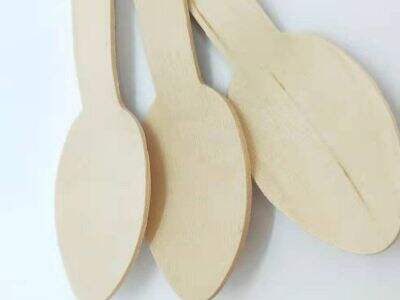Colher é uma ótima mordida, tendo seus prós e contras. Somos encorajados a considerar o impacto que essas colheres podem ter no meio ambiente e no mundo em geral. Examinaremos colheres de madeira e de plástico neste texto. Comparar esses produtos pode ajudar você a fazer uma escolha melhor para o planeta quando precisar de uma colher.
A diferença entre colheres de madeira e de plástico
Em árvores, como bétula ou madeira de faia — colheres de madeira são. Podemos cultivar mais árvores ao longo do tempo, pois essas árvores são recursos renováveis. pequenas colheres de pau descartáveis têm uma aparência adorável e orgânica que adiciona calor a uma cozinha. Colheres de plástico, no entanto, vêm de materiais como óleo (ou gás natural). Esses recursos não são renováveis, pois uma vez que os usamos, eles não podem ser substituídos. Colheres de plástico são inúteis uma vez descartadas. Na verdade, elas podem ficar em aterros sanitários por centenas de anos.
Dê o seu garfos e colheres de madeira descartáveis a melhor chance de longevidade seguindo essas dicas. Mas elas não precisam ficar muito molhadas, e quando isso acontece, elas tendem a quebrar ou quebrar ao meio. Isso é algo que vale a pena considerar no uso de colheres de madeira. Colheres de plástico são extremamente leves e duráveis. Elas podem suportar alimentos quentes sem derreter, e elas não absorvem manchas ou odores, como colheres de madeira podem. Há uma desvantagem para colheres de plástico, no entanto. Quando as descartamos, se não as jogarmos fora corretamente, elas podem ir para nossos oceanos ou rios e ser prejudiciais para peixes e outros animais.
Colheres de madeira são melhores que colheres de plástico
Colheres de madeira e de plástico têm suas vantagens e desvantagens. Entender isso ajudará você a escolher a colher que é a certa para você.
Colheres de Pau: Prós
- Eles podem se decompor e fazer compostagem, o que também é bom para a Terra.
- Elas são baseadas em recursos renováveis, então podemos plantar mais árvores”, disse ele.
Colheres de Pau: Contras
- Eles podem quebrar ou rachar sob exposição prolongada a muita umidade.
- Eles podem abrigar bactérias quando não são bem limpos, o que nunca é bom.
Colheres de plástico: prós
- Com a habilidade de serem rápidos e leves, mas também tendo força suficiente para fazer o trabalho, eles jogam usando pequenas quantidades de energia em qualquer alma.
- Elas são resistentes ao calor, então colheres de plástico podem ser usadas com alimentos em altas temperaturas, incluindo sopas quentes.
Colheres de plástico: Contras
- Eles vêm de recursos não renováveis, o que é ruim para o meio ambiente.
- Colheres de plástico não são devidamente dissolvidas, por isso poluem o meio ambiente.
A melhor colher ambientalmente correta
Não se esqueça que isso colher e garfo de madeira descartáveis você vai escolher terá um impacto direto na natureza e no meio ambiente, então seja gentil com a mãe natureza. Se você quer uma colher que seja biodegradável e proveniente de um recurso renovável, colheres de madeira geralmente são a melhor opção. Elas dão à sua cozinha uma aparência agradável e natural também. Tenha em mente que colheres de madeira podem ser compostadas ou queimadas como combustível sem colocar a terra em risco. Tudo o que você precisa ter em mente é cuidar bem delas - mantendo-as secas, limpas para que não sejam danificadas.
Colher de plástico (Superdurável e leve, Spoontainable e fácil de limpar) Algumas coisas que você precisa saber sobre colheres de plástico: Agora é muito importante descartá-las corretamente para não prejudicar o meio ambiente. Recicle-as se puder, ou descarte-as corretamente para que não acabem em lugares onde possam causar danos.
Considerações finais: tanto colheres de madeira quanto de plástico têm seus prós e contras. No entanto, colheres de madeira são geralmente a escolha mais sustentável. Aqui está o porquê: biodegradáveis, sustentáveis e podem trazer uma bela adição à cozinha. Colheres de plástico certamente são úteis em alguns cenários, particularmente para piqueniques ou grupos grandes onde muitas colheres serão necessárias. Não importa o tipo, certifique-se de usá-las corretamente e, em seguida, descarte-as adequadamente para garantir que tenhamos uma paisagem segura e saudável. Como você pode ver agora, todas as colheres de madeira são úteis por uma grande variedade de razões na cozinha e podem ajudá-lo a tomar decisões ecologicamente responsáveis, vá para Kaixuan Wood.
 EN
EN
 AR
AR
 BG
BG
 HR
HR
 CS
CS
 DA
DA
 NL
NL
 FI
FI
 FR
FR
 DE
DE
 EL
EL
 HI
HI
 IT
IT
 JA
JA
 KO
KO
 NÃO
NÃO
 PL
PL
 PT
PT
 RO
RO
 RU
RU
 ES
ES
 SV
SV
 TL
TL
 IW
IW
 ID
ID
 SR
SR
 SK
SK
 VI
VI
 HU
HU
 TH
TH
 FA
FA
 MS
MS
 HY
HY
 LO
LO
 LA
LA
 NE
NE
 KK
KK
 UZ
UZ
 KY
KY


